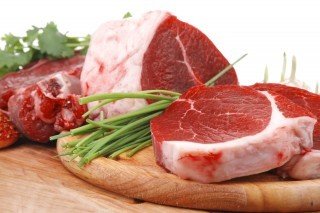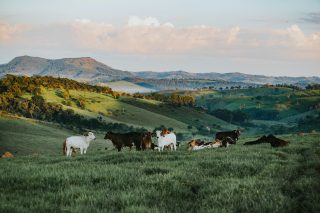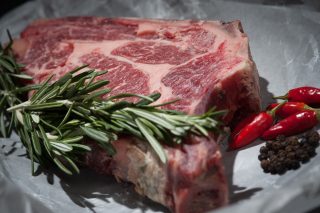We’ve all heard it, as a population, we need to stop eating so much meat. Red meat is often noted as being worse for the environment than meats like chicken and fish. But is that the case? In 2021, climate change lives at the forefront of most of our minds. With Earth Day coming up in April, it’s a good time to evaluate the impact of red meat on both our bodies and the environment. Is red meat just bad for the environment or is it bad for us too?
What is red meat?
 Red meat can be described as the meat of mammals that is red when it’s raw. Overall, it’s one of the most controversial foods. As humans, we have been eating red meat for many years, and it has seemingly aided our evolution. But now, many studies seem to indicate that red meat isn’t actually good for us at all.
Red meat can be described as the meat of mammals that is red when it’s raw. Overall, it’s one of the most controversial foods. As humans, we have been eating red meat for many years, and it has seemingly aided our evolution. But now, many studies seem to indicate that red meat isn’t actually good for us at all.
Because we as a population have been eating red meat for so long, our digestive systems are well equipped to handle it. However, the meat that we are eating these days isn’t what it used to be. For instance, the Masai eat a lot more red meat than the average westerner but remain fit and healthy. This is likely because the meat they eat roams free and still remains largely unaffected by more harmful modern farming practices.
Instead, the meat that we eat as Westerners is mostly factory-raised and fed only a grain-based diet. The cows we eat are also often fed growth-boosting hormones and antibiotics. Another issue with the meat products that we eat these days is that they are also highly processed. It isn’t just the meat that we eat. Instead, it is “smoked, cured and then treated with nitrates, preservatives and various chemicals”.
Different types of meat
When it comes to meat, we tend to use the term as a coverall. It includes red meat, processed meats, and white meats. But these meats are not all the same. According to Healthline, these are the different types:
Processed meat: Mostly, this meat comes from factory-raised animals. Once the cows are slaughtered, the meat goes through a variety of processing

Photo by Helena Lopes from Pexels
methods. Examples of processed meats include foods such as sausages and bacon.
Conventional red meat: In this case, the meat is usually not processed and if it is, the amount of processing is limited. Like processed meats, the animals are usually factory farmed. This category includes all meats that are red when raw such as lamb, beef, and pork.
White meat: These include only meats that are white when cooked. Examples of these are chicken and turkey.
Grass-fed, organic meat: This type of meat is probably the closest to what the Masai are eating. These animals are fed on what is available naturally and are raised without the use of any drugs or hormones. There are also no chemicals added to the meat during production.
Red meat and the environment
 With Earth Day coming up on April 22nd, it’s inevitable that we all start to think about how our daily habits affect the environment. Red meat is particularly bad for the environment and reducing your intake is a good way to reduce your personal impact on the planet. The production of beef is very harmful to the environment. It requires “160 times more land and produces 11 times more greenhouse gases than staple plant-based foods”. This includes foods such as “potatoes, wheat, and rice”. According to LIVEKINDLY, for every kilogram of beef produced, “36 kilograms of CO2” is released into the atmosphere.
With Earth Day coming up on April 22nd, it’s inevitable that we all start to think about how our daily habits affect the environment. Red meat is particularly bad for the environment and reducing your intake is a good way to reduce your personal impact on the planet. The production of beef is very harmful to the environment. It requires “160 times more land and produces 11 times more greenhouse gases than staple plant-based foods”. This includes foods such as “potatoes, wheat, and rice”. According to LIVEKINDLY, for every kilogram of beef produced, “36 kilograms of CO2” is released into the atmosphere.
Impact of large scale farming of meat
Another issue with the production of beef is large-scale farming. Because of the high demand, the scale of the land needed to produce the amount of meat required is enormous. Cattle farming contributes to deforestation as cattle farmers try to make more space for their cattle to graze. It seems that many of the fires in the Amazon rainforest were actually started on purpose by cattle farmers in need of more land.
Lamb also has a high carbon footprint. In fact, some scientists believe that its carbon footprint is even higher than that of beef. This seems to be due to the fact that lambs produce much less edible meat than cows. This means that, in order to get the same amount of meat, more sheep are needed.
What is Earth Day?
Earth Day takes place every year on the 22nd of April. This year, the theme is ‘Restore our Earth’. The purpose of Earth Day is to reinforce the importance of taking action against climate change. It first started in 1970, 2020, and marked 50 years of Earth Day. In the beginning, Earth Day was only celebrated in the United States. It only went global 20 years later in 1990. When it does go global, it puts environmental issues at the forefront of our minds. This was when recycling became more of a priority worldwide. This year, in 2021, the focus is on supporting local areas that are disproportionately affected by climate and environmental issues.
So, is red meat good or bad?
It’s one of the most nutritious foods available. It’s packed full of “vitamins, minerals, and antioxidants” that can have amazing health benefits.

Photo by mali maeder from Pexels
Unprocessed red meat is also relatively low in calories and contains a lot of protein. It also contains vital nutrients, such as “creatine and carnosine”. Typically, people who don’t eat meat are deficient in these nutrients and require supplements. A lack of these nutrients can have a negative impact on “muscle and brain function”. Grass-fed meat, particularly beef, is even higher in nutrients than grain-fed beef. It contains “plenty of heart-healthy omega-3s, the fatty acid CLA and higher amounts of vitamins A and E”.
Most of the so-called negatives of red meat consumption are only really measured by vague observational studies. The issue is that this evidence is not based on formal scientific studies and is therefore only proof of association and correlation. Many of these observational studies do show that consumption of red meat is associated with a “greater risk of cardiovascular disease, cancer, and death”. Because we use the term “meat” so broadly, all red meats are tarred with the same brush. But not all meat is created equal. For instance, there is evidence that processed meats pose a higher risk. They are directly associated with “an increased risk of heart disease and diabetes”.
It also greatly increased the risk of death, but the same was not true for unprocessed meats. It’s clear therefore that the issue isn’t actually with eating meat as much as it is with what meat you’re eating. It’s important to remember that although these findings come from a large group of studies, it isn’t proof positive. The link between red meat and cancer is also fairly tenuous. For instance, in many of the studies processed and unprocessed red meats were both included and there was no differentiation between the two. It seems that the cooking process is often more of a problem when it comes to a higher risk of cancer than the red meat itself.
Final thoughts
Whilst it does appear that red meat is far less damaging than we may previously have thought, eating too much of anything isn’t good for you. Instead, a balanced diet is always the answer. If you enjoy red meat and want to eat it, the best option health-wise is grass-fed organic meat. It’s likely that these meats will be more costly but the benefits outweigh the negatives. It’s best to try and avoid processed meats such as bacon and sausages as much as possible as it seems likely that it’s the processing rather than the meat that’s the problem. Whilst it may be relatively healthy for us, it isn’t good for the environment and is thus best eaten in moderation. Try to make a large portion of your diet plant-based and add in meat (especially red meat) only occasionally.
References
https://www.healthline.com/nutrition/is-red-meat-bad-for-you-or-good#TOC_TITLE_HDR_3
https://www.earthday.org/history/



![women [longevity live]](https://longevitylive.com/wp-content/uploads/2020/01/photo-of-women-walking-down-the-street-1116984-100x100.jpg)










